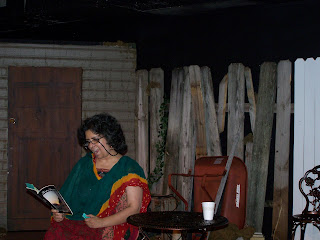Are you one of the few Americans who have Columbus Day off? I am not. It's one of those federal holidays I've never had off. During my college and grad school years, I rarely had any kind of Fall Break between the start of classes and Thanksgiving, so I didn't even have accidental Columbus Days.
If I had lots of time, I'd read Charles C. Mann's
1493, but alas, I don't have that kind of time. Happily, he had a great conversation with Terry Gross on NPR's
Fresh Air. You can hear it
here. It's a discussion of how the collision of worlds had lasting impact to this day. He talks about it in terms of ecological convulsions: promiscuous honeybees, leaf blight, and all sorts of other treats.
I've had these collisions on the brain on a lot these days. I've been doing some baking, and for my autumnal baking, I like to have pecans.
What has happened to the price of pecans???!!!!!! They cost almost as much as pistachios these days.
What has happened is that Asian countries have discovered this nut, which increases demand, and suddenly, there are pecan shortages, which means we all pay more. Sigh. In a way, that's the narrative arc of much of the old world meets new world sagas; it all boils down to capitalism and marketing which worked or didn't. And of course, there's the interplay of disease. If the Africans hadn't been so resistant to the malaria that flourished in swampy North America, they wouldn't have been enslaved.
But back to my pecan musings.
Pecans used to be a sort of trashy nut off of trashy trees. That's how my grandmother thought of them. You couldn't be sure which years your trees would produce pecans and which years they wouldn't, and when they did, you'd have all these nuts to deal with.
I remember visiting my grandparents' house in South Carolina one year after a particularly prolific year of production for their pecan tree. I took a nutcracker outside and spent the whole Thanksgiving break shelling pecans.
I always was a strange high school kid. I couldn't bear to think of all those nuts just rotting back into the earth, what with the Christmas baking season upon us.
Little did I know that that experience would inspire a poem almost 20 years later. I was thinking of pecans and lost trees and ancestral land that had been sold, and out of that came my poem, "Family Jewels," which you'll see below.
I've also been thinking of those early colonies and their success or failure. I once heard a historian say that the colonies that survived are the ones where there were plenty of women. When asked why, the historian said that women reminded the men to plant food crops, not just cash crops: you'll starve to death if you only plant tobacco. My mind occasionally thinks back to this idea, and I hope one day to write the poem that will do it justice as a metaphor.
In the meantime, here's a pecan tree poem for your Columbus Day. It was first published in
CrossRoads: A Southern Culture Annual.
Family Jewels
Some women hoard the family jewelry.
As each child comes of age, reaches
an important milestone, the matron doles
out an appropriate piece.
I hide the last bags of pecans
in my vault of a freezer. I will receive
no more nuts when these are gone.
My grandmother has sold the land,
the trees bulldozed for a subdivision.
As children, we were sent to scout
the nuts from under the leaves. Some children get
Easter egg hunts, but we had the real autumnal treasure.
Whoever brought in the most got to dictate
dessert for the evening: buttery cookies or a pie
crunchy with nuts in the crust and the topping.
For punishment, we had to shell the nuts,
pick the prize pieces away from the bitter bits.
I enjoyed the enforced time out
even as my hands stained brown,
the cool air calming me, the crack
of the shell draining my aggression.
Now my children don’t even realize
that nuts grow on trees. They approve
of grocery store nuts, even though they’re stale
and oddly chewy. So unlike the ones I hoard
in the freezer, ration out for special occasions.
I portion out these prizes, savor
every last nugget, mourn the loss
of family and homeplace and majestic trees.


























